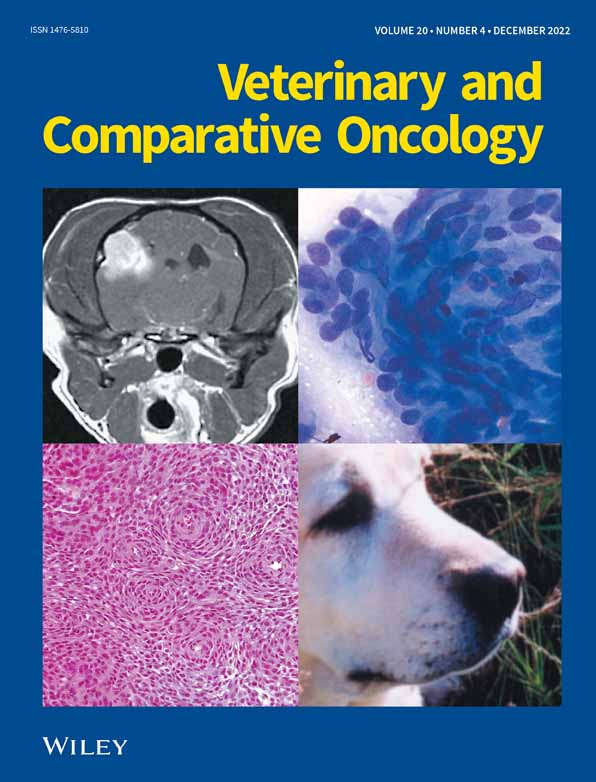Facilitating stakeholder involvement in Comparative Oncology research: A qualitative analysis of key stakeholder opinions and perceptions
Funding information: Health Research Board, Grant/Award Number: 203930/B/16/Z; Wellcome Trust; the Health Service Executive National Doctors Training and Planning and the Health and Social Care, Research and Development Division
The application of Comparative Oncology approaches in biomedical research are becoming increasingly important. Researchers are collectively endeavouring to apply the 3Rs principles of replacement, reduction and refinement to the use of animal models,1 and to improve outcomes for both veterinary and human patients. However, this field remains challenging, as it requires the successful collaboration between multiple stakeholders, including patients, pet owners, biomedical researchers, veterinary and medical healthcare professionals. In their respective areas, these groups have many different priorities, use differing language and operations, with little overlap in practice or experience despite their similarities and common goals.
To create meaningful and equal engagement across stakeholder groups, it is important to note the various knowledge base each group possesses.2 We conducted a study to assess the opinions and perceptions of these stakeholders in Comparative Oncology research, to provide researchers with information to aid engagement and study design for the future. We held semi-structured focus group workshops comprising four stakeholder cohorts (n = 14); biomedical researchers, veterinary and medical healthcare professionals and individuals with a lived experience of cancer. These interviews focused upon the participant's knowledge, perceptions and values applied to Comparative Oncology research. Following this, a survey was designed in partnership with these focus groups to distribute to a wider audience (n = 174), targeting respondents from the various stakeholder cohorts.
In summary, researchers trying to engage this wide range of disciplines and foster multi-disciplinary collaborations will need to be cognisant of these knowledge gaps when explaining proposals and inviting colleagues to take part in Comparative Oncology projects. Our findings suggest that animal welfare and improvements in cancer care need to be clearly and frequently explained to stakeholders in all Comparative Oncology studies. It is also imperative researchers from all disciplines clearly communicate that the findings from Comparative Oncology studies will not result in direct cross-species translation without due diligence, though they will complement and aid in our understanding of cancer pathogenesis and therapeutics. Addressing these knowledge gaps and areas of concern will encourage increased engagement and participation in Comparative Oncology research.
We found a wide variation across groups in their level of understanding and awareness of Comparative Oncology. Veterinary healthcare practitioners were very comfortable in their knowledge of the concept, reporting the extraction of information from human studies as routine practice, whereas most medical healthcare practitioners and individuals with a lived experience of cancer reported they were not familiar with the concept at all, or had never heard of it. Similarly, each stakeholder group prioritised different values when discussing how this research should be conducted. Animal welfare was a concern repeatedly mentioned by those with a lived experience of cancer and veterinary healthcare professionals focused upon the use of ‘humane options’ and ‘quality of life not extent of life’ for animal treatment. This sentiment was also repeatedly expressed by pet owners from all stakeholder groups. In contrast medical and veterinary healthcare professionals placed emphasis on the importance of convenience, for both species' participants and healthcare providers, suggesting that participation should be made ‘as easy as possible’. Finally, the applicability of cross-species research and translation was a concern mentioned across all stakeholder groups. Participants repeatedly emphasised the importance that physiological differences between humans and animals must be considered at the forefront of any study.
ACKNOWLEDGEMENTS
The authors thank Dr Mirjam Heinen for contribution to questionnaire design, as well as Patient Voice in Cancer Research (PVCR) and its members for their participation.
FUNDING INFORMATION
This work was performed within the Irish Clinical Academic Training (ICAT) Programme, supported by the Wellcome Trust and the Health Research Board (Grant Number 203930/B/16/Z), the Health Service Executive National Doctors Training and Planning and the Health and Social Care, Research and Development Division, Northern Ireland.
CONFLICT OF INTEREST
The authors declare no conflicts of interest.
Open Research
DATA AVAILABILITY STATEMENT
The data that support the findings of this study are available on request from the corresponding author. The data are not publicly available due to privacy or ethical restrictions.




